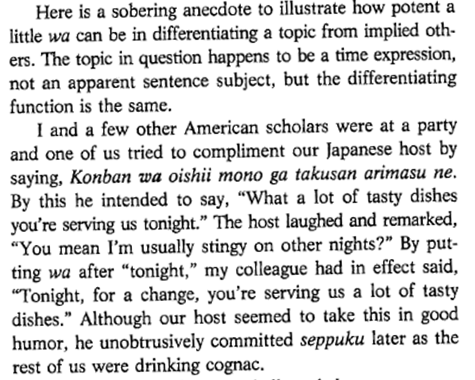病んでいる間に抗生物質を飲みすぎてはいけない。そうすると、免疫の効率はだんだん悪くなる。それを忘れないでね。
Translation
Don’t take too many antibiotics while you’re sick. Doing so will gradually impair the efficiency of your immune system. Don’t forget that, okay?

病んでいる間に抗生物質を飲みすぎてはいけない。そうすると、免疫の効率はだんだん悪くなる。それを忘れないでね。
Don’t take too many antibiotics while you’re sick. Doing so will gradually impair the efficiency of your immune system. Don’t forget that, okay?
「君を失う訳にはいかない」と「君を失っては敵わない」は違います。一つには後者がこの歌です。
“I can’t afford to lose you” and “I can’t stand to lose you” are different. For one thing, the latter is this song.
あっちゃー、電車に遅れちゃった。。。まあ、次発はもうすぐ着くから、大丈夫かも。
Ah, I missed the train… Well, the next one is arriving soon, so it might be okay.
仕事が難しいです。
The job is difficult.
Is です necessary and/or correct here?
Hi again!
です is what is called a politeness marker and is a basic part of the polite language (丁寧語) together with the ます form of verbs. You can find more detail in this section of Tae Kim’s Guide to Learning Japanese.
Therefore, です is necessary if you are using 丁寧語 to speak to someone. If you were speaking to your senior, you would use です at the end of this sentence and say “仕事が難しいです”. If you were talking to a friend or a coworker, you would be saying “仕事が難しい” and probably add “よ” or “ね” at the end. (More on those particles here (よ) and here (ね)).
In any case, whatever you choose will be correct.
Finally, what calls my attention most is the use of が instead of は. The famous は/が usage…  I would have expected “仕事は…”, using が gives the idea that you want to say that “The job is the thing that is difficult”.
I would have expected “仕事は…”, using が gives the idea that you want to say that “The job is the thing that is difficult”.
As the grammar point on が says, が emphasizes what comes before it, while は emphasizes what comes after it. Here is a good article about は and が and here a video on the same theme.
HTH!
EDIT: the situation that Misa describes in minute 24:30 of the video is quite similar to the one that Jay Rubin tells happened to him in the chapter “Wa and Ga, The Answers to Unasked Questions” of his book, to wit:

今日は「文プロ」が働かないので、何も勉強ができない。しかし、私の今日の文が書ける。
Today ‘Bunpro’ is not working, so I can’t study anything. However, I can write my sentence for today.
ー黒木さん、最近、今田さんに話しかけたの?
ー早朝に挨拶しあったんだけど。。。なんで?
ー昨日さ。。。本当に怒っている目で見られて、まるで嫌われているみたいだった!私について何か言ったのか?
ーいいえ、何も。もしかして、気のせいだったか?自分で直に話しかけてみた方がいいと思う。
I believe it should be 「何も勉強ができない」.
Your variant sounds more like「何でも勉強ができる」(I can learn anything).
私は日本語を言うのが下手です。
Right you are, thank you very much, I’ll fix it!
昨日は僕の脳も働かなかったと思ってる。
Hi! 私も下手ですね。
If you want to say that you are poor at speaking/talking Japanese, I guess ‘話す’ or ‘喋る’ would be more appropriate than ‘言う’.
Your sentence sounds more like “I am poor at saying ‘Japanese’”.
Thanks a lot for the correction!
Yeah, now that I think about it, 言う means “to say”, not “to speak”  This why I am 下手
This why I am 下手 
Also, doesn’t that what I wrote sound more like “I am poor/bad at saying ‘Japanese’.”, since 日本語 means “Japanese”?
Indeed it is ‘Japanese’, my brain is still out of work today. I’ll correct it too.
Since you want to say that you’re bad at speaking in japanese, I would write it like this:
私は日本語で話すのが下手です。
Thanks for clarification! For a second I doubted my vocab knowledge 
Thanks a lot! May I ask why you used で instead of を, tho?
In this case both are really close in terms of meaning. I just wanted to mark 日本語 as something that is required to do the talking (話す):
日本語を話す - to talk Japanese;
日本語で話す - to talk in Japanese.
I will never forget your kindness and thoroughness in these early days of my journey. Thank you so much. Such a helpful comment!
今日の文:
春は今年早いよね。
Spring is [came] early this year, no?
はい、そうですよ。
ゾンビの黙示録
「私たちに入らせても、彼は親切な人だとは限らない。むしろ、悪気のある人かもしれないから、他の場所を見つけた方がいい。。。行こう。」
Zombie apocalypse
“Even if he’ll let us in, that doesn’t mean he’s a kind person. On the contrary, he might have a malicious intent, so we better find another place. . . Let’s go”.